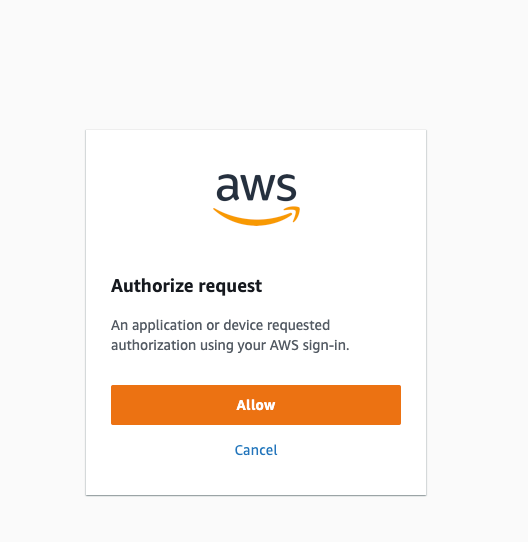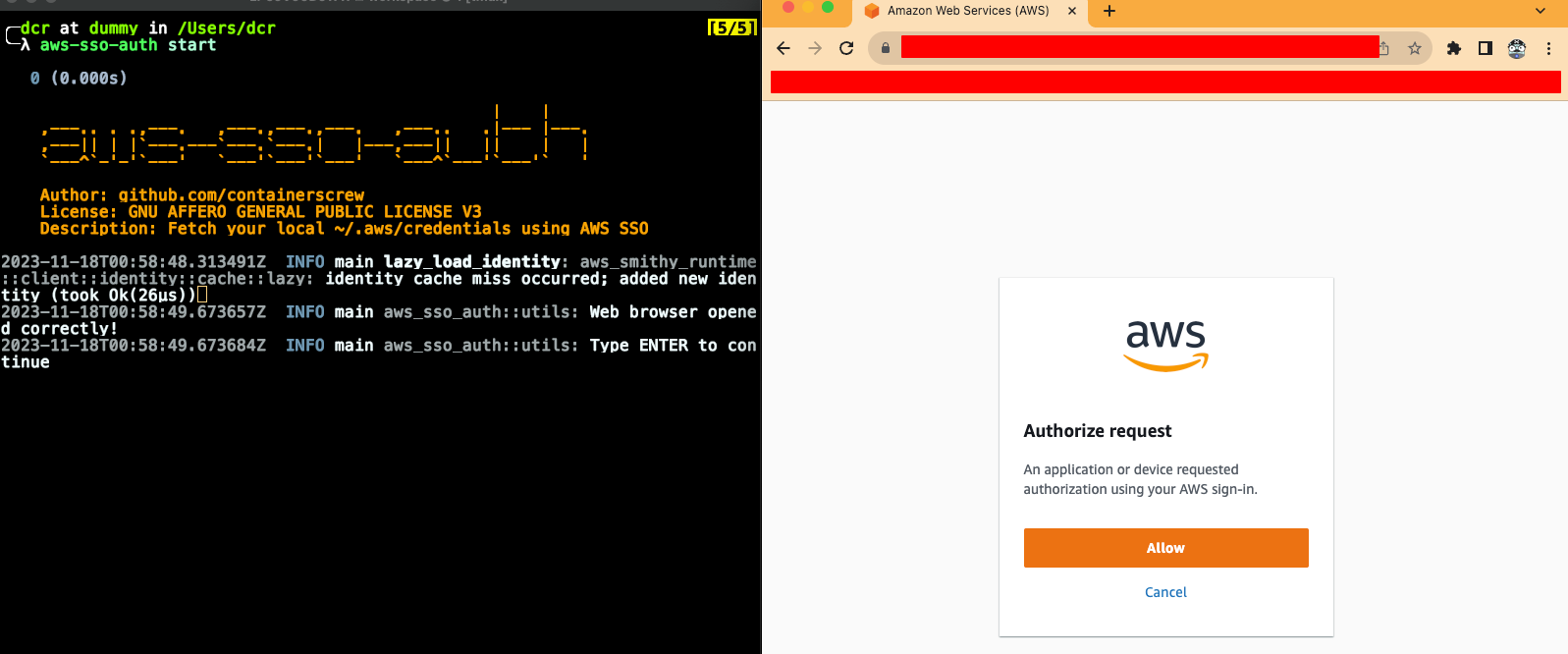Fetch your local ~/.aws/credentials using AWS SSO
Build with ❤ in Rust
Table of Contents generated with DocToc
- Pipeline badges
- Introduction
- Requirements
- Supported platforms
- Supported IDP
- Installation
- Usage
- Switching accounts in your terminal
- Examples
- TO DO (not implemented yet)
- Contribution
- LICENSE
This tool will help you download your AWS organization's account credentials using AWS SSO. What we previously set manually with IAM users (aws_access_key_id and aws_secret_access_key), we now have automatically using AWS SSO.
In this case ONLY Google Workspaces has been tested as external IDP. More info in supported IDP, just below
In short, we want to have the credentials of our AWS accounts/roles, using AWS SSO, stored in our ~/.aws/credentials to be able to work daily with our tools (terraform, aws cli...)
This tool requires human interaction, since the authorization request must be manually approved from the browser.
- Our default browser that we work with must be authenticated with our IDP. In this case, gmail if we use Google Workspaces.
| OS | ARM64 | AMD64 |
|---|---|---|
| Mac | √ | √ |
| Linux | √ | √ |
- Google Workspaces
If using other IDP with AWS SSO in your organization, and this tool don't work, please provide feedback in this repo. Open an issue and I will try to reproduce it!
curl --proto '=https' --tlsv1.2 -sSfL https://raw.githubusercontent.com/containerscrew/aws-sso-auth/main/scripts/install.sh | bashInstall rust toolchain:
curl --proto '=https' --tlsv1.2 -sSf https://sh.rustup.rs | shcargo install aws-sso-auth --git https://github.com/containerscrew/aws-sso-authgit clone https://github.com/containerscrew/aws-sso-auth
cd aws-sso-auth/
cargo build --release
./target/release/aws-sso-authIf you need to install specific version, go to https://github.com/containerscrew/aws-sso-auth/releases and download the binary
aws-sso-auth config --start-url https://XXXX.awsapps.com/start --aws-region eu-west-1 --profile-name mycompanyThis command will save a file in
~/.aws/aws-sso-auth.jsonwith the previous configuration
- profile_name: the name of the profile configuration you are saving. For example, your company name
- start_url: your start URL of SSO AWS app (https://docs.aws.amazon.com/singlesignon/latest/userguide/howtochangeURL.html)
- region: AWS region where you have your AWS SSO configured. By the default is
us-east-1
aws-sso-auth startOr with flags:
aws-sso-auth start -w 5 -r 40- workers: Number of async/thread AWS API calls. + threads == + speed. Recommended: 5/8 max to avoid AWS API 429 errors TooManyRequestsException. Default: 6
- retries: Number of retries when AWS API return errors. Default: 60
This will open your default local browser where you have your IDP authenticated. In my case, I used Google as external IDP with AWS SSO
Adjust the number of concurrent threads and retries depending on the number of accounts you have. If you only have 10 accounts (for example), it wouldn't make much sense to maybe use 20 workers and 100 retries, right?
If everything went well, you must authorize the request. Something like that:
aws-sso-auth -l debug start- --log-level: Log level. Default: info. Possible values: info, warn, trace, debug, error
aws-sso-auth --versionaws-sso-auth --helpAll the credentials will be saved in your $HOME/.aws/credentials with the following pattern: [AccountName@RoleName] you are assuming
cat ~/.aws/credentialsThe configuration file should be something like this:
[Account1@administrator]
aws_secret_access_key=XXXX
region=eu-west-1
aws_access_key_id=XXXX
aws_session_token=XXXX
[Account2@read-only]
aws_secret_access_key=XXXX
region=eu-west-1
aws_access_key_id=XXXX
aws_session_token=XXXXCopy the following function in your ~/.zshrc or ~/.bashrc:
aws-profile () {
PROFILE=$(cat ~/.aws/credentials|grep "^\["|sed "s/]$//"|sed "s/^\[//"| fzf)
export AWS_PROFILE=$PROFILE
}Then, source the file if needed:
source ~/.zshrc or source ~/.bashrcCopy the following function inside ~/.config/fish/function/aws-profile.fish
function aws-profile
set -gx AWS_PROFILES $(cat ~/.aws/credentials | sed -n -e 's/^\[\(.*\)\]/\1/p' | fzf)
if test -n "$AWS_PROFILES"
set -xg AWS_PROFILE $AWS_PROFILES
echo "Selected profile: $AWS_PROFILES"
else
echo "No profile selected"
end
endThen source the fish configuration:
source ~/.config/fish/config.fishType aws-profile in your terminal, and you will see all the accounts you have credentials in your $HOME/.aws/credentials
fzf is needed as a dependency for the interactive account switcher
- Multiple AWS SSO account configurations inside
aws-sso-auth.jsonImagine you are working in a consultant, and you have multiple customers with AWS SSO, and you want to save all their config (start-url, region) inside the config file. - If you have 200 accounts, only 123 (max), will be fetched
- Select which account credentials (with prefix) do you want to fetch (maybe you don't want to fetch all accounts)
- Testing and mocking AWS API calls
- Codecoverage pipeline not working
- Changelog with release-please
- Create Homebrew Formula
- Documentation in code functions
- Customize how account credentials are saved:
[AccountName@RoleName]for[PUT-YOUR-LOGIC-HERE]
Pull requests are welcome! Any code refactoring, improvement, implementation. I just want to learn Rust! I'm a rookie






